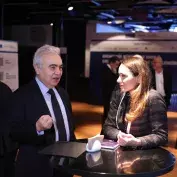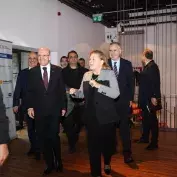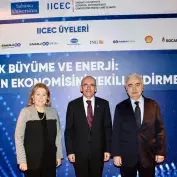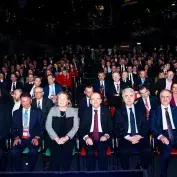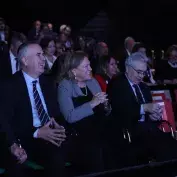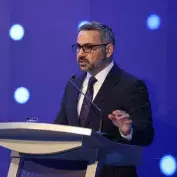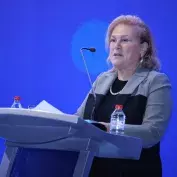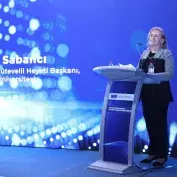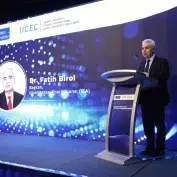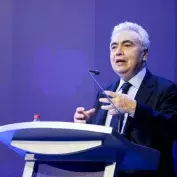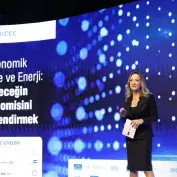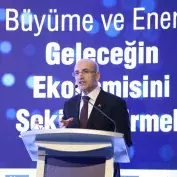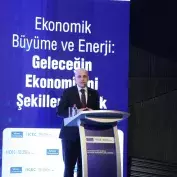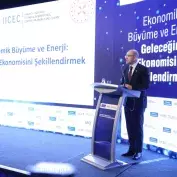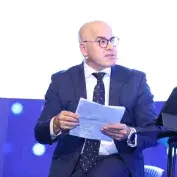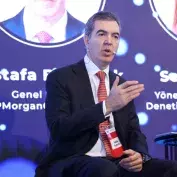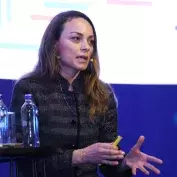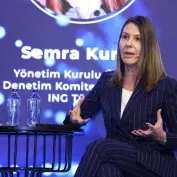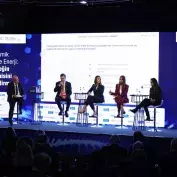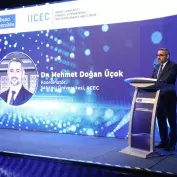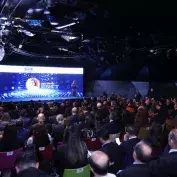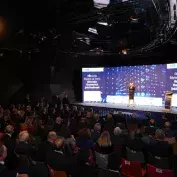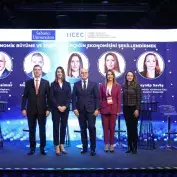FORUM SPEAKERS
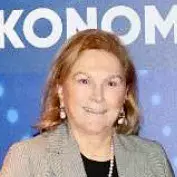
Güler Sabancı
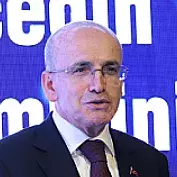
Mehmet Şimşek
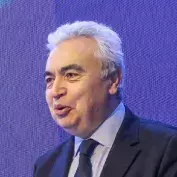
Dr. Fatih Birol
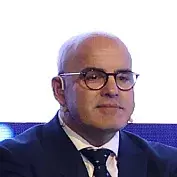
Kıvanç Zaimler
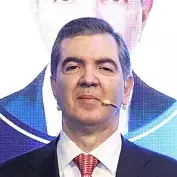
Mustafa Bağrıaçık

Semra Kuran
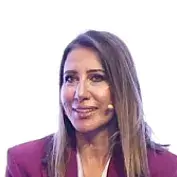
Şule Kılıç

Zeynep Savaş
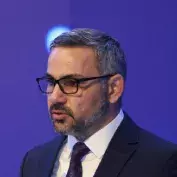
Dr. Mehmet Doğan Üçok
This year's IICEC Conference, hosted Mehmet Şimşek, the Minister of Treasury and Finance, as the guest of honor. In his presentation Minister Şimşek discussed economic growth and Türkiye's economic policies. He stated, “Türkiye will achieve a more efficient and competitive economy in terms of global integration, structural transformation, and inflation.”
The IICEC Conference, held annually by the Istanbul International Center for Energy and Climate (IICEC) of Sabancı University, took place on December 24 with the theme ‘Economic Growth and Energy: Shaping the Economy of the Future.’ The conference was hosted by Güler Sabancı, Founding Chair of the Board of Trustees of Sabancı University, and Dr. Fatih Birol, President of the International Energy Agency (IEA) and Honorary President of IICEC.
“There are serious issues facing long-term global growth”
In his speech sharing strategies and priorities regarding global economic growth and Türkiye’s economic policies, Minister Şimşek addressed the structural factors that limit global growth in the long term. He remarked, “When we look at the five-year growth forecasts of the last 30-40 years, we are currently in the period with the lowest growth predictions. There are serious issues facing long-term global growth. The most significant factor that will constrain oil and natural gas prices is this situation along with China. Increasing protectionism in trade is also one of the major factors hindering growth. The restrictions we face in the trade of goods have started to spill over to services, investment, and finance. According to a study by the IMF, if this situation continues, there will be a global loss equivalent to the size of France and Germany combined. As trade is actually one of the engines of growth, and this engine is not functioning as it used to. If the commitments given by the U.S. before the elections are to be implemented, it will not be the best scenario for the global economy and developing countries.”
“We will invest more in human capital and strengthen the innovation ecosystem in the coming period”
Highlighting that Türkiye will be among the countries least affected by this scenario, Mehmet Şimşek stated, “What is happening in the world will surely affect us, but we will be relatively less affected. Regional integration will gain importance in the world; logistics hubs will become more significant. Türkiye is advantageous in this regard because we are at the center of the world. A crucial component of our long-term strategy lies in regional integration. Türkiye has significant advantages, as we have great potential that can be activated. We will take important steps and implement reforms in the upcoming period, especially to increase participation of women in the labor force. Türkiye also ranks well in the artificial intelligence readiness index compared to an average developing country. In the coming period, we will invest more in human capital, we will strengthen the innovation ecosystem, and particularly focus on investments in digital infrastructure. Türkiye will achieve a more efficient and competitive economy in terms of global integration, structural transformation, and inflation”. Mehmet Şimşek also emphasized Türkiye’s leading position in renewable energy among G-20 countries, and the progress achieved in reducing energy intensity, while also addressing the importance of issues raised by the global climate crisis in the upcoming period.
“Energy plays a key role in facilitating economic and social development”
In her opening speech at the conference, Güler Sabancı, Founding Chair of the Board of Trustees of Sabancı University, stated, “In 2024, geopolitical developments, efforts to strengthen energy supply security, the striking effects of the climate crisis, and dynamics related to clean energy technologies were among the prominent topics on the global agenda. Türkiye has reached a position as one of Europe’s largest and the world’s most dynamic energy sectors through its energy strategies, investments, and emerging markets.”
“Oil markets will be more at ease in the coming year”
In his speech, Dr. Fatih Birol, President of the International Energy Agency (IEA) and Honorary President of IICEC, focused on three topics: how oil and natural gas prices will change, deep transformation happening in the global energy sector, and trade wars in energy. Birol stated, “Despite the major political tensions ongoing for months in the Middle East, oil prices are still hovering around $70. Growth in oil demand is weaker compared to the past. Around 15 months ago, we at the IEA projected an increase of 1 million barrels in global oil demand for 2024, which is quite low historically. To understand energy markets, we particularly need to look at China. Over the last decade, more than 60% of the increase in global oil demand came from China. However, growth rate of the Chinese economy has slowed down, which has affected oil demand. The rise of electric vehicles can be cited as the second reason for the decline in oil demand. Currently, one in every four cars sold globally runs with electricity. This increasing ratio significantly slows the growth of demand in oil. Another factor in the decline is the increase of oil production in four countries to which I refer to as the “American Quartet”: the USA, Canada, Brazil, and Guyana. The increase of production in these four countries has even outpaced the total increase of global oil production. We expect that next year, oil markets will have a more cushioned period in terms of prices. On the natural gas side, a significant amount of new energy shipments from the USA and Qatar is expected between the end of 2025 and 2026-2027. This new energy supply coming in the next 2.5-3 years will be equivalent to half of the supply provided in the last 40 years. This situation will transform the natural gas market, which has been strong for sellers until now, into one where buyers will be more advantageous, creating downward pressure on prices. This is a very positive development for countries like Türkiye that are energy-dependent.”
“In the next 10 years, electricity demand will grow six times more than energy demand”
Fatih Birol expressed the following regarding structural transformation of the global energy sector: “A new era is beginning: the age of electricity. In the last decade, energy demand grew, but electricity demand grew twice as much. In the next decade, electricity demand is expected to grow six times more than overall energy demand. Electricity usage is increasing, which can be reasoned by the rise in air conditioning usage, the need for electricity for electric vehicles, and data centers driven by artificial intelligence. Electricity is expected to play a significant role in the energy sector. Looking at geopolitical developments happening around the world, we foresee cooperation opportunities between Europe and Türkiye. As a significant development, Europe will declare a “Clean Energy Pact” in 2025, which will determine its role in tomorrow's economy. It will be decisive regarding the steps to be taken in the industrial sector, and to draw a roadmap not only within Europe but also with its partner countries. This development presents an opportunity for Türkiye in terms of cooperation with Europe. The global geopolitical situation is moving towards a less efficient state in terms of international cooperation. It seems like competition will increase, and trade wars will come to the fore. In this context, I believe that energy industry and trade policies need to be blended within the framework of countries' economic priorities.”
“Energy transformation offers a chance to establish a sustainable economic model”
An insightful panel followed the speeches of the conference, that was moderated by Kıvanç Zaimler, President of Energy Group at Sabancı Holding, with the participation of Deputy General Manager of the Turkish Ministry of Foreign Affairs, Ambassador Zeynep Savaş; CEO of JPMorganChase Bank, Mustafa Bağrıaçık; Board Member and Audit Committee Chair of ING Türkiye, Semra Kuran; and Deputy Country Director of the European Bank for Reconstruction and Development (EBRD), Şule Kılıç. The panel discussed the critical role of energy policies in the transformation of world economies. In his opening remarks, Kıvanç Zaimler stated, “Energy transformation offers not only a cleaner future but also a chance to establish a stronger and more sustainable economic model. Investments in renewable energies contribute to economic growth by reducing dependency, while also making Türkiye’s geopolitical position a strategic center in energy corridors. In line with the 2053 net zero target, we can accelerate this transformation through cooperation between public sector, private sector, and academia to shape the economy of the future from today.”
"International cooperation is essential to achieve goals"
In her speech at the panel, Ambassador Zeynep Savaş, Deputy General Manager of the Turkish Ministry of Foreign Affairs, stated, "The primary goal of our energy policies is to ensure our energy security, and it has now become closely tied to our efforts in the fight against climate change. The issue of energy is now intertwined with geopolitical considerations, clean energy transition, competition for access to critical minerals, digitization, advancements in artificial intelligence, and diplomacy related to environmental issues. Recent global developments are significant for our energy diplomacy. To implement our energy policies and achieve the goals we have set, international cooperation is a necessity. In recent years, ensuring energy supply has evolved from being an issue limited to our prosperity into a strategic matter that concerns our national security."
"Finance sector can play a catalytic role in transformation"
Semra Kuran, a Member of the Board of Directors and Chair of the Audit Committee at ING Türkiye, emphasized that energy transformation could become a strategic opportunity for Türkiye with the right policies, investments, and an inclusive approach. Kuran stated, "An approach that centers on inclusivity, sustainability, and innovation is of great importance in this process. Energy transformation is a long journey; at this point, it is critical for all stakeholders and sectors to move towards a common goal. Finance sector can play a catalytic role in this transformation. Through innovative financing models, inclusive policies, and effective risk management, capital can be directed towards projects that create sustainable value in the long term. As ING Group, which has built strong foundations in sustainability for over 30 years, we continue to make significant contributions to our country's green transformation with our global expertise and experience, positioning ourselves as one of the action leaders in sustainable finance in Türkiye."
"Sustainable Financing Mechanisms Must Be Established"
Şule Kılıç, Deputy Country Manager at the European Bank for Reconstruction and Development (EBRD), stated that EBRD plays a critical role in helping Türkiye achieve its green energy goals. Kılıç said, "In cooperation with the private sector, we provide financial and technical support for projects that will accelerate green transition. The biggest challenge we face in this transformation is the scale of financing required for energy transition. Therefore, it is necessary to establish sustainable financing mechanisms through the joint efforts of international financial institutions, public and private sectors. We believe that by strengthening policies that will encourage green investments and developing financial instruments, we will maximize our country's potential in the coming period through cooperation of all stakeholders."
